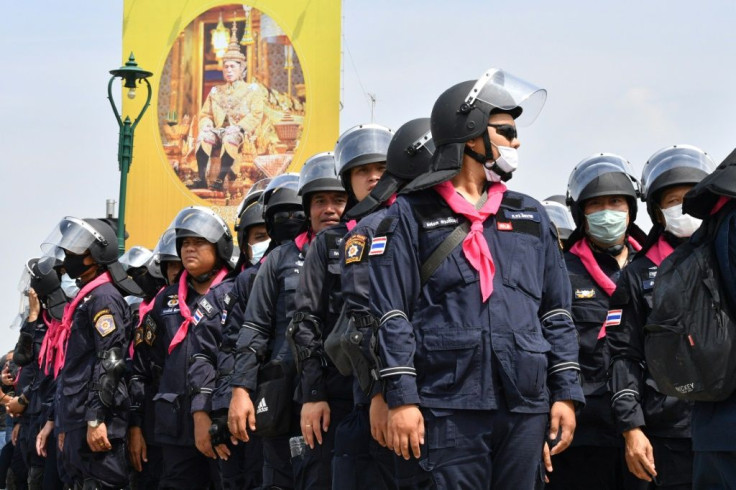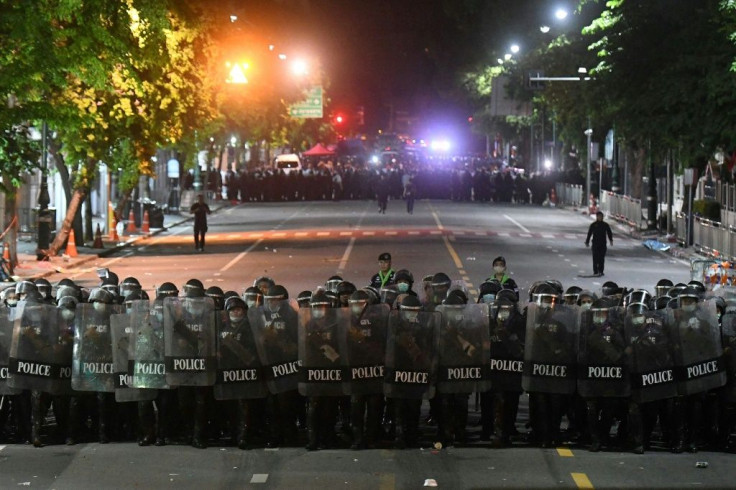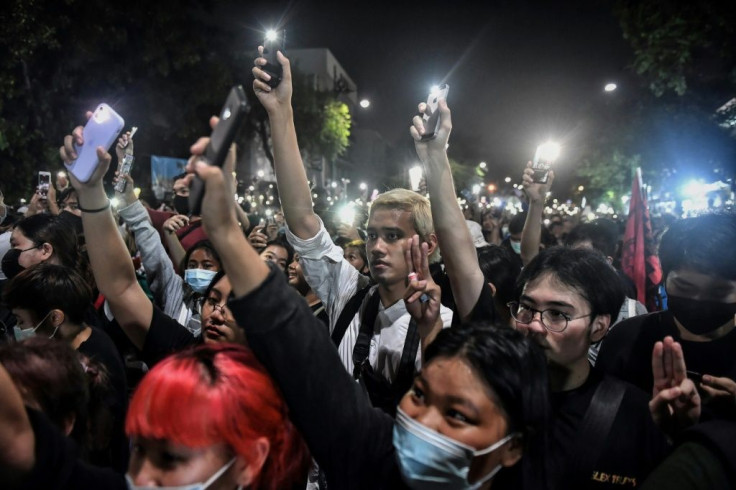What's The Latest With Thailand's Protests And What Comes Next?
A student-led pro-democracy movement has gathered pace across Thailand for the past three months, with activists making unprecedented calls for reforms of the kingdom's unassailable monarchy.
More than 20 protesters, including prominent leaders, were arrested Thursday, after the government declared an emergency decree banning gatherings of more than four people.
Tensions flared the previous day as thousands of demonstrators rallied around Democracy Monument before marching to government house where some camped overnight.
Here is what we know:

The protesters are rallying against the government of Prime Minister Prayut Chan-O-Cha.
The former army chief led a coup in 2014 and kept the kingdom under military rule for five years.
Under the junta, a new constitution was drafted before elections were held last year.
Prayut was voted in to lead a civilian government -- a win analysts say was tilted by the new charter's provisions.

Protesters say the whole process was a stitch-up and are calling for parliament to be dissolved, the constitution rewritten and an end to the harassment they are facing.
They also have a list of 10 demands for the monarchy, including throwing out a defamation law that shields the powerful royal family from criticism.
The law is one of the harshest of its kind in the world, carrying a jail sentence of up to 15 years per charge.
Discontent has been simmering since February when the leaders of an opposition party, popular among young people, were banned from politics.

Many protesters say the move against the Future Forward Party was politically motivated.
A pandemic lockdown, which sent Thailand's economy into freefall, exposed the chasm between the billionaire class and the poor.
And in June, prominent activist Wanchalearm Satsaksit, who had been living in self-exile in neighbouring Cambodia, disappeared.
Activists in Thailand lit up Twitter with their demands for answers.

The online campaign spilled offline mid-July and a wave of protests across the country began, with up to 30,000 turning out in mid-September for what was the largest gathering since the 2014 coup.
Wednesday's demonstration in particular has drawn the ire of authorities because of the reaction of protesters encountering a royal motorcade.
Some protesters held up the three-fingered salute -- a gesture of defiance the pro-democracy movement has borrowed from the popular "Hunger Games" books and films -- as the royal motorcade carrying Queen Suthida passed by.
True, Thailand has seen a cycle of violent street protests and military coups over the decades.
But in the past the protest movements had vast financial and political clout behind them.
Today's student demonstrators say there is no single leader -- a strategy partly inspired by the Hong Kong pro-democracy protests.
Daring to take on the taboo topic of the monarchy is also a first.
Under the constitution, the royals -- including super-rich King Maha Vajiralongkorn -- are supposed to stay out of politics, but they wield enormous clout.
Since the king took the throne in 2016, he has made unprecedented changes, taking direct control of the palace's fortune and moving two army units under his command.
At his side are the arch-royalist military and powerful billionaire clans.
Mixed. The student-led protests have drawn support from a broad demographic.
It initially attracted big crowds of so-called "Red Shirts" -- supporters of former exiled premier Thaksin Shinawatra -- though their numbers have dropped in recent demonstrations.
The movement has also spread to high schools across the country, with teenagers tying white bows of solidarity in their hair and on backpacks.
The emergency decree issued Thursday gives police powers to arrest anyone suspected to be involved in the protests.
Hundreds of Thai protesters later gathered in defiance of the sweeping crackdown, with the situation now "fluid and combustible," according to Political analyst Thitinan Pongsudhirak from Chulalongkorn University.
While the movement has suffered a setback because of the arrests, it is likely to "maintain traction because popular grievances are so wide and deep", Thitinan said.
© Copyright AFP 2024. All rights reserved.





















